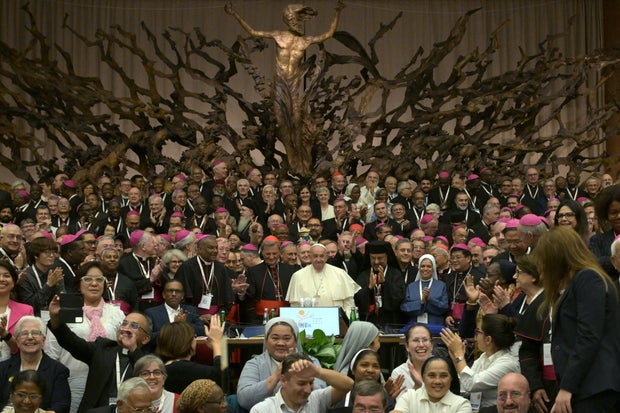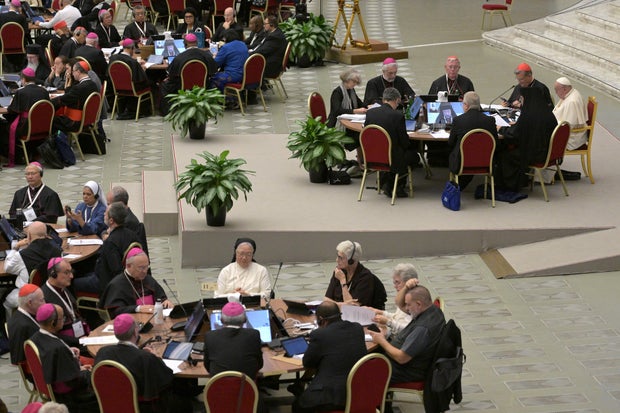Pope Francis’ yearslong process to reform the Catholic Church closed Saturday with recommendations that fell wanting giving women more equity as hoped but reflected the pope’s goals for a church that no less than listens more to its followers.
In a big move, the pope said he wouldn’t issue a teaching document from the recommendations, which called for girls to be allowed all opportunities that Church law already provides while leaving open the contentious query of allowing women to be ordained as deacons.
As a result, it stays unclear what if any authority or impact the synod’s final recommendations could have, given the aim of the exercise was to supply the pope with specific proposals on reform.
“In this time of war, we should be witnesses to peace” and provides an example of living with differences, the pope said in explaining his decision.
TIZIANA FABI/AFP via Getty Images
Francis said he would proceed to hearken to the bishops’ counsel, adding “this shouldn’t be a classic way of endlessly delaying decisions.”
Deacons perform lots of the same functions as priests, corresponding to presiding over baptisms, weddings and funerals, but they can’t rejoice Mass. Advocates say allowing women to be deacons would help offset the shortage of priests. Opponents say it might signal the beginning of a slippery slope toward ordaining women to the all-male priesthood that Francis has repeatedly reaffirmed.
Earlier this week, the Vatican’s top doctrinal officer, Cardinal Victor Manuel Fernandez, told the extraordinary assembly of 368 bishops and laypeople that Francis had said the moment “shouldn’t be ripe” for allowing the ordination of girls as deacons. He didn’t respond on to a request to define what would determine “ripeness” for a greater role for girls.
The multi-year synod process had sparked great hopes for change, especially for girls, who’ve long complained that they’re treated as second-class residents within the church. Women are barred from the church’s highest ministerial positions, yet do the lion’s share of the work running Catholic hospitals and schools and passing the religion onto future generations.
Speaking to the synod on Thursday, Fernandez explained that a special working group would proceed beyond the closing of the meeting, but that its focus can be on discussing the role of girls within the church — not within the diaconate, or the office of deacon. He added that while working with women in previous pastoral roles, “most didn’t ask for or want the diaconate, which can be cumbersome for his or her lay work.”
The meeting asked for “full implementation of all of the opportunities already provided for in Canon Law with regard to the role of girls, particularly in those places where they continue to be under-explored.” It leaves open “the query of girls’s access to diaconal ministry.”
TIZIANA FABI/AFP via Getty Images
It was probably the most contested paragraph of the ultimate document, with 258 votes for and 97 against. It was not clear if the “no” votes were since the language went too far or not far enough.
The consequence is a disappointment for Catholics who’ve been campaigning for recognition that girls share a spiritual calling that is not any different than a person’s. They also noted that despite the inclusion of girls within the synodal process, the working group that’s guiding discussions on women’s role is being run by the Roman curia, operating outside the synod.
“I feel the ultimate document can be received with much disappointment and frustration by many ladies all over the world who’re hoping for concrete changes,” said Kate McElwee, the chief director of the Women’s Ordination Conference.
While she acknowledged a “cultural shift,” she said “the pace of that shift is maybe too slow for many ladies.”
The first phase of the synod process ended last 12 months by concluding it was “urgent” to ensure fuller participation by women in church governance positions, and calling for theological and pastoral research to proceed about allowing women to be deacons.
If before the synod the concept of allowing women to be deacons was a fringe proposal pushed by Western progressives, the concept gained attention through the debate. It became something of a litmus test of how far the church was going to go, or not, to deal with demands of girls for greater equality and representation within the church’s highest ranks.
Francis, had other ideas, insisting that ordaining women would just “clericalize” them and that there have been loads of other ways to empower women within the church, even leading Catholic communities, without resorting to ordination.




